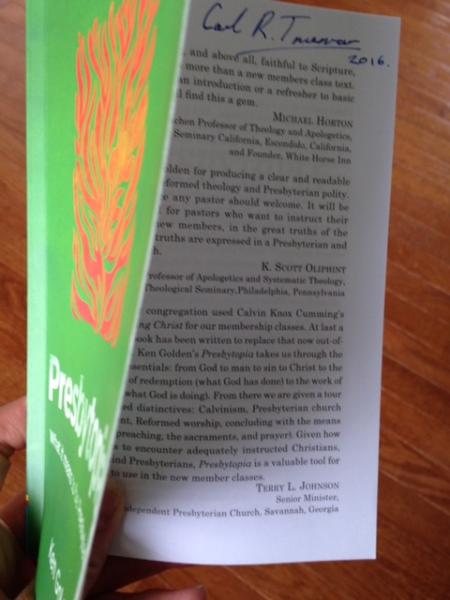What it means to be a Presbyterian

May 3, 2016
 Somehow, I’ve ended up with a copy of Ken Golden’s new book, Presbytopia, signed by none other than Carl Trueman. How does such a thing happen? Well, I certainly didn’t pilfer it right of his bookshelf or anything. I mean, he said I could have it. Now I’m wondering what other books I could have walked away with while he was in the giving mood…
Somehow, I’ve ended up with a copy of Ken Golden’s new book, Presbytopia, signed by none other than Carl Trueman. How does such a thing happen? Well, I certainly didn’t pilfer it right of his bookshelf or anything. I mean, he said I could have it. Now I’m wondering what other books I could have walked away with while he was in the giving mood…What does it mean to be a Presbyterian? Many outside the denomination, and even some within it, have wondered this very thing. My Roman Catholic mother-in-law has conceded that her son is a much better Presbyterian than he ever was a Catholic. But she really doesn’t know much about where his confessions and practices of faith differ from her’s. Growing up as a Southern Baptist, I looked at Presbyterians as fuddy duddies who thought they were more special than everyone else. In some of the retreats where I have spoken, I’ve heard women who’ve grown up in the church say things like they were good Presbyterians before they were Christians, or that they didn’t really even understand what was distinctive about Presbyterianism. And there are many Baptists who tolerate us Presbies, as they are thankful for many of our books, but don’t quite understand our positions on things like baptism and church government. Presbytopia helps cut through the stereotypes and get to the important matters with biblical clarity.
Membership classes are important. First of all, the very idea of why one should join a church needs to be explained well. And we should never join a church without knowing what it believes, some of its history, and how it governs and worships. This is a big task for elders. Ken Golden has done the work in presenting and teaching these basics in an organized fashion with helpful discussion questions following each brief chapter.
While this will be an excellent resource for new membership classes, I think Presbytopia is a great little book for anyone who would like to learn more about Presbyterianism. I can’t believe how succinct it is. In just over a hundred easy to read pages, Golden covers the essentials of the Christian faith, Reformed distinctives on the doctrines of grace, church government, and worship, as well as the means of grace by which we receive Christ and all his benefits. I particularly liked his section on means of grace. His chapter on baptism should be extremely helpful for Presbyterian pastors who have credo Baptists in their congregations. It will be a go-to for me to help communicate the Presbyterian stance better to my Baptist friends.
Overall, I find Golden’s succinctness to be profitable. However, a couple sentences did have me wishing he’d either elaborated more, or had been even more concise in his wording, when discussing why the serpent approached Eve rather than Adam. Since the book serves as a tool for teaching and discussion in a membership class, I’m glad he proposes a question regarding that at the end of the chapter. I’m sure the discussion questions provided throughout the book will lead to great discussions in that setting.
Also, I wanted to mention the glossary of terms and sample liturgy given as appendixes. New lingo, or walking into a worship service in a denomination different from what you are familiar with, can be intimidating. Golden provides a handy way to quell that realm of the unknown.
What does it mean to be a Presbyterian? Pick up Golden’s book , or pilfer it from a friend’s bookshelf, and acquaint yourself with this well-presented guide.




